
 ome friends and I collected common questions that have been raised regarding the recent statement from John MacArthur and the Elders of Grace Community Church, titled "Christ, Not Caesar, Is Head of the Church." Here's our FAQ in its current form:
ome friends and I collected common questions that have been raised regarding the recent statement from John MacArthur and the Elders of Grace Community Church, titled "Christ, Not Caesar, Is Head of the Church." Here's our FAQ in its current form:1.Why did you consent to the original government order, citing Romans 13 and 1 Peter 2?
The elders of Grace Church decided to follow the recommended procedures set forth in the original government order, not because we believed the state has a right to tell churches when, whether, or how to worship. To be clear, we believe that the original orders were just as much an illegitimate intrusion of state authority into ecclesiastical matters as we believe it is now. However, because we could not possibly have known the true severity of the virus, and because we care about people as our Lord did, we believe guarding public health against serious contagions is a rightful function of Christians as well as civil government. Therefore, we voluntarily followed the initial recommendations of our government. It is, of course, legitimate for Christians to abstain from the assembly of saints temporarily in the face of illness or an imminent threat to public health.
When the devastating lockdown began, it was supposed to be a short-term stopgap measure, with the goal to "flatten the curve"—meaning they wanted to slow the rate of infection to ensure that hospitals weren't overwhelmed. And there were horrific projections of death. In light of those factors, our pastors supported the measures by observing the guidelines that were issued for churches.
But we did not yield our spiritual authority to the secular government. We said from the very start that our voluntary compliance was subject to change if the restrictions dragged on beyond the stated goal, or politicians unduly intruded into church affairs, or if health officials added restrictions that would to attempt to undermine the church's mission. We made every decision with our own burden of responsibility in mind. We simply took the early opportunity to support the concerns of health officials and accommodate the same concerns among our church members, out of a desire to act in an abundance of care and reasonableness (Philippians 4:5).
But we are now more than twenty weeks into the unrelieved restrictions. It is apparent that those original projections of death were wrong and the virus is nowhere near as dangerous as originally feared. Still, roughly forty percent of the year has passed with our church essentially unable to gather in a normal way. Pastors' ability to shepherd their flocks has been severely curtailed. The unity and influence of the church has been threatened. Opportunities for believers to serve and minister to one another have been missed. And the suffering of Christians who are troubled, fearful, distressed, infirm, or otherwise in urgent need of fellowship and encouragement has been magnified beyond anything that could reasonably be considered just or necessary. Major public events that were planned for 2021 are already being canceled, signaling that officials are preparing to keep restrictions in place into next year and beyond. That forces churches to choose between the clear command of our Lord and the government officials. Therefore, following the authority of our Lord Jesus Christ, we gladly choose to obey Him.

2.Are you saying that pastors who choose to follow the government guidelines are thereby guilty of abdicating their responsibility before the Lord and violating the God-ordained spheres of authority?
To be clear, we're not trying to tie faithfulness to a particular evaluation of the severity of the virus or the best way to take precautions in response. For many churches, elders will independently conclude that the recommended regulations are the best course for the present time. Our point is that these decisions are the church's call to make, not the state's.
How elders make their decisions on whether and how to meet is a Christian liberty issue, and not every faithful congregation will make those decisions exactly as we have. Given the size, health, age, and location of their congregation, as well as how the virus has affected their own community, some pastors and elders may decide to suspend fellowship for a bit longer. Our statement was not intended to target faithful pastors and elders striving to exercise their own independent discretion and navigate their own congregation's needs. Our desire was simply to equip and empower such faithful men—not cause them trouble or bind their consciences to choices we are making.
With that said, it is not a Christian liberty issue for elders to farm out to the state their God-given authority to make such decisions. That is abdication. Pastors and elders who allow the government to dictate the size of their gatherings—or whether they can meet at all—give authority to the government that God has given only to Christ as the head of the church. If church leaders have ceded Christ's authority to the government, which God never gave nor intended government to have, it is our prayer that they would repent of that and reaffirm that Christ and not Caesar is the head of the church. The statement calls other faithful congregations to join us in recognizing that God has committed to elders the authority and responsibility to make these decisions, and they should not forfeit to the state that authority and responsibility in contradiction to God's design.
3.Are the spheres of church and state as distinct as the statement implies? Doesn't the church submit to government fire codes and zoning restrictions?
 If so, why not likewise acquiesce to these public health restrictions?
If so, why not likewise acquiesce to these public health restrictions?While it is true that the church is subject to fire codes and zoning restrictions, those are routine civil, not spiritual, matters, so the state exercises legitimate authority enforcing them. But the government's authority in civil matters associated with the church does not give it authority in spiritual matters, which are the lifeblood of the church. Attendance caps, singing bans, and distancing requirements (especially those that are established arbitrarily and by executive fiat) have the effect of suppressing or eliminating the congregational worship that is an essential element of church life. Therefore such orders fall outside the jurisdiction of civil authorities.
4.Why did you ask for signatures on this statement?
We wanted to find a way for other pastors and church leaders who agreed with our perspective—but who were perhaps apprehensive about reopening—to have a way to express their support and solidarity.
5.Why haven't the elders of Grace Church enforced social-distancing rules and the wearing of masks?
The medical community has widespread and dogmatic disagreement on the effectiveness of both of these restrictions. We do not believe it is within the elders' purview or responsibility to resolve that disagreement or act as enforcers of such a hotly debated policy dispute—especially when government authorities themselves have declined to enforce those rules during countless mass demonstrations with crowds much larger than any of our worship services have ever drawn. Instead, we leave it to each individual to be "fully convinced in his own mind" whether or not to follow these guidelines. We gladly welcome anyone to Grace Community Church and leave those choices to each individual, in the spirit of Romans 14.
6.What if officials intervene in our services or force us to comply?
The threat of even the most severe consequences from government has never stopped faithful people from submitting to the authority of God's Word. And we know that any opposition we receive will be within the will of our Lord, and for the good of His church. We simply desire to gather peacefully and reverently in worship of Jesus Christ (1 Timothy 2:2), free from the prohibitions of the state. We also understand how desperately the world needs the church, because we are (in Jesus' words) "the salt of the earth" and "the light of the world" (Matthew 5:13-14)—an absolutely indispensible influence for truth and righteousness in society. Of all people, we understand how desperately the world needs the Gospel, a spiritual priority far more important than any physical threats which can kill the body but are unable to kill the soul. If the governing authorities feel the need to assail us for that, we will trust the Lord, rejoice, and glorify God for the privilege of suffering in the name of Christ (1 Peter 4:12þ16; cf. Philippians 1:27þ30).
7.Is Grace Church open for anyone to attend?
Yes. Please feel free to join us for worship.
8.Must we meet in the tent, or will the worship center be open?
We trust the members of our congregation to be mature adults, so they and their families are welcome to sit wherever they feel comfortable. We have ample outdoor seating available, and have uniformly observed that congregants have been respectful of those wearing masks and/or seeking to social distance.
9.What if I don't feel comfortable returning?
We understand that we are in unprecedented times, and that the information from governing authorities and health officials changes each day. If you are not comfortable returning to worship, please feel free to take advantage of the live stream and other alternatives. We love you, we miss you, and we are eager to welcome you back when you are able to join us (1 Pet 1:22), but we recognize there are some of our members for whom this is the right decision—especially if you are sick or experiencing symptoms of the virus, are at high risk of complications due to age or other health conditions, or have regular contact at home with someone who is at high risk.
While you're away, please continue to reach out to your fellowship group pastors, Bible study shepherds, and other fellow members. We are eager to learn of and meet your needs.
10.When will fellowship groups, children's ministry, the nursery, and student ministries resume?
As soon as we can work out the logistics.



 avin Ortlund has written
avin Ortlund has written  In the discussions currently taking place in various Internet forums, it seems there is no shortage of church leaders who, faced with the pragmatic difficulties of the recent pandemic, have adopted the view that it's just fine for a pastor to make plans not to gather the flock at all for the better part of a year. Those who think that way ought to feel the sting of John MacArthur's rebuke. The prevalence of such thinking among evangelicals is a disturbing reality, and one that shouldn't be glossed over or downplayed just because someone's feelings might accidentally get hurt.
In the discussions currently taking place in various Internet forums, it seems there is no shortage of church leaders who, faced with the pragmatic difficulties of the recent pandemic, have adopted the view that it's just fine for a pastor to make plans not to gather the flock at all for the better part of a year. Those who think that way ought to feel the sting of John MacArthur's rebuke. The prevalence of such thinking among evangelicals is a disturbing reality, and one that shouldn't be glossed over or downplayed just because someone's feelings might accidentally get hurt.
 ot this question today in more than one Tweet (regarding
ot this question today in more than one Tweet (regarding 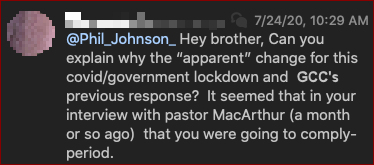

 do of course, wholeheartedly affirm the principles of Romans 13:1-7 ("be in subjection to the governing authorities") and 1 Peter 2:13-17 ("Submit yourselves for the Lord's sake to every human institution")—while recognizing also that those commands are limited by the principle of Acts 5:29 ("We must obey God rather than men").
do of course, wholeheartedly affirm the principles of Romans 13:1-7 ("be in subjection to the governing authorities") and 1 Peter 2:13-17 ("Submit yourselves for the Lord's sake to every human institution")—while recognizing also that those commands are limited by the principle of Acts 5:29 ("We must obey God rather than men").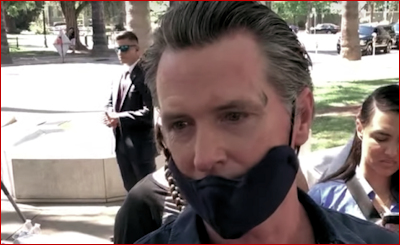
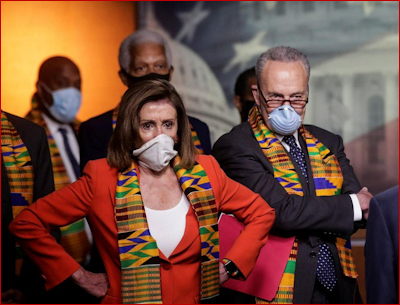
 ohn McWhorter, professor of linguistics, comparative religion, music history, and Americana at Columbia University has been pointing out (since at least 2015) that
ohn McWhorter, professor of linguistics, comparative religion, music history, and Americana at Columbia University has been pointing out (since at least 2015) that 
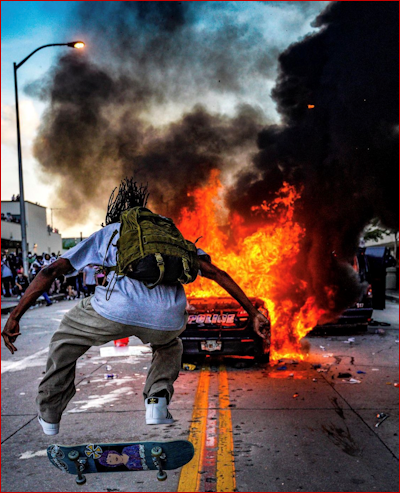
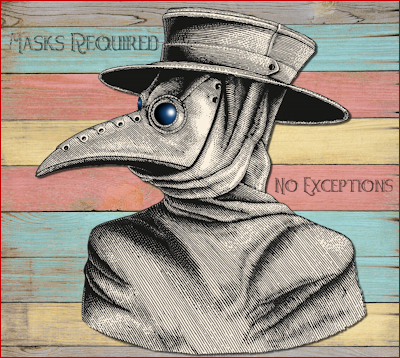
 his guy, angry that Grace Community Church yielded to the 9th Circuit Court's ruling banning church meetings in California this weekend, Tweets at me: "An unjust law need not be followed."
his guy, angry that Grace Community Church yielded to the 9th Circuit Court's ruling banning church meetings in California this weekend, Tweets at me: "An unjust law need not be followed."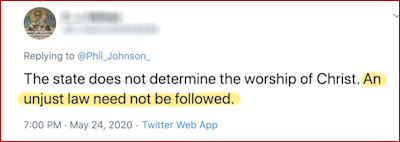

 ne of the questions prompted by the quarantine is about "virtual communion." After all, in lieu of regular worship services, we are listening online every Sunday while our pastor preaches from the pulpit of the church. So why not have a kind of virtual communion service, where we all take the elements simultaneously in the privacy of our homes?
ne of the questions prompted by the quarantine is about "virtual communion." After all, in lieu of regular worship services, we are listening online every Sunday while our pastor preaches from the pulpit of the church. So why not have a kind of virtual communion service, where we all take the elements simultaneously in the privacy of our homes?










